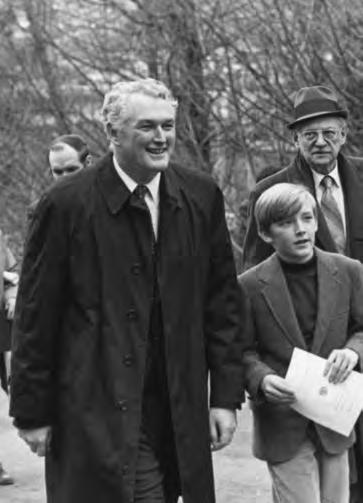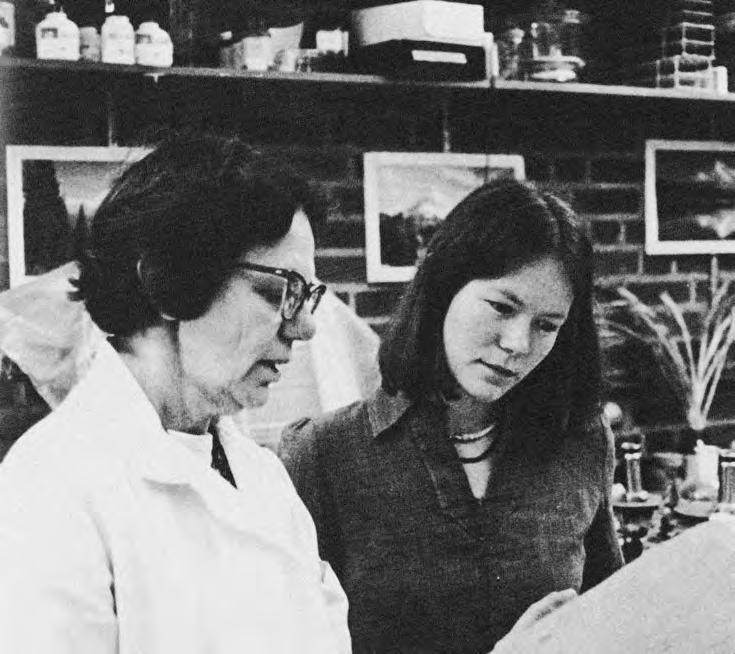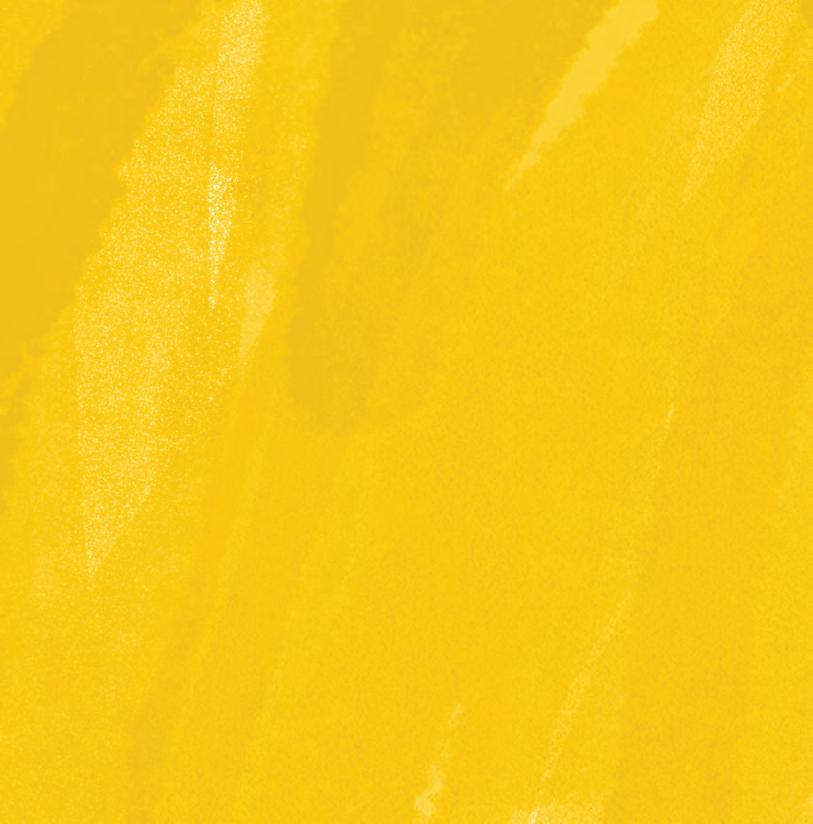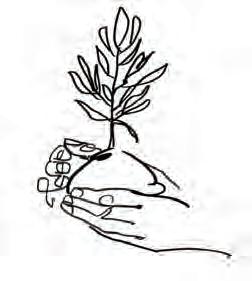
11 minute read
Mailbox
Write to us! We love getting mail from readers. Letters should be about Reed (and its alumni) or Reed Magazine (and its contents) and run no more than 300 words; subsequent replies may run only half the length of their predecessors. Our decision to print a letter does not imply any endorsement. Letters are subject to editing. (Beware the editor’s hatchet.) For contact information, look to your left.
Remembering President Bragdon
I just read your piece on Paul Bragdon [Reed President 1971–88], and want to thank you for it. As a freshman in the fall of 1974, I had, of course, not the least notion of the perilous straits that Reed was steering through. I did have, however, an awareness of Bragdon. Tall, with Paul Newman–esque good looks, calm, genial, and nearly always smiling, he was very present on campus without being in any way obtrusive.
In later years, as I learned more about the man, I simply thought of him as the man who saved Reed College. And that is how I have referred to him for many years now.
When my current students become aware of my own long connection with the school, they are often curious and amused at my responses to their inevitable queries about “Old Reed.” I tell them that my student days were marked by a certain vigorous intellectual scrappiness; a feeling of “Here we all are, come hell or high water, out to get an education, damn it!” Being at Reed back then had an edginess and excitement. This was perhaps a sign of those times, but probably also a response to being at a school we students did not even know was teetering. And though I admit to missing some of those qualities in present-day Reed, I am still grateful to Bragdon for directing the school onto safer and sounder footing. John Vergin ’78 Portland
When I arrived at Reed as a transfer student in 1983, I quickly became friends with Florence Lehman ’41, who was then the director of alumni relations. She knew I was spending Thanksgiving on campus and invited me to her house for dinner.
She didn’t mention who else was going to be there, so I was surprised when I arrived to see Paul and Nancy Bragdon among the assembled. I had seen Paul on campus, but had never spoken with him, and I assumed the dinner would end up being stiff and formal.
But Paul didn’t roll like that. When I mentioned that I was from New York, he told stories of his time at the mayor’s office and the blackout of 1965. Paul sat in a rocking chair, a drink in his hand, and was so relaxed and engaging that I forgot he was a college president.
Over my years at Reed, Bragdon always said hello when we crossed paths. When I passed through the registrar’s office during the thesis parade, he had a big smile and handshake for me. When I worked in the admissions office after graduation, we talked shop on more than a few occasions. He remained personable and accessible despite all the troubles on campus during those years. Ken Belson ’87 New York City
Never had a lot of contact with President Bragdon, but he definitely had a sense of humor. I had to make an appointment with him my senior year when I was applying to law school to see how high I could aim. I wore my best tie (my only tie, if truth be told), ironed my nicest pair of jeans, and even wiped the dust off my Frye boots. He welcomed me into his office, opened my file, looked at it, smiled, and said, “You can apply anywhere you want.” Still wouldn’t tell me my actual grades, but getting into Berkeley Law was good enough for me.
Norm Vance ’74 Berkeley, California
“Howl” at Reed
I was one of a small group of Reed students (plus a few friends of Gary Snyder ’51 from his time at Reed) who attended the 1956 reading of “Howl” that was described in the Reed Magazine. The only other fellow student that I can remember from that event was Art Stone ’60, a math major with wide cultural interests.
My memory is that Gary Snyder also read from his recent work, but I may be confusing that with a later event at Reed.
There was also a rowdy party afterwards at an off-campus apartment (on Southeast Powell Blvd., if I recall correctly). I am sure I accurately recall holding a working mss. of “Howl” in my hands, and noticing that some of the more daring language (judged by the standards of that era) had been written in with pencil on the original typescript. Students with cars were a rarity then. I wonder how I got there and back from the Reed campus?
A few weeks, perhaps a month, later, I was sitting on a grassy knoll behind the Greyhound bus station in San Francisco during spring vacation. Looking up, I recognized Allen Ginsberg, who was on his lunch break from his job humping baggage at the station. I walked up to him. “Allen Ginsberg? The poet?” This must have been one of his first experiences of public celebrity. He was clearly pleased. We talked briefly. As in several chance encounters over the years in various venues, Ginsberg was cordial and modest. William Bernhardt ’60 Staten Island, New York
President Bragdon, “the man who saved Reed College.”
Women in Science
Prof. Helen Stafford [biology 1954–87] was my thesis advisor 1959–60. I didn’t have much background in plants but did have some background in organic chemistry and took some biology courses. Only genetics sparked my interest. It was with some trepidation that I started with her at the last minute at the beginning of my senior year. It was quite a struggle compared to a summer I spent doing research in human physiology at the University of Washington, where I was basically left to my own devices. With Helen I learned to persevere through some rough times, the kind of research investigation that pulled me through my postdoctoral work in later years. I think that the Reed painting of her was really the way she was with her students. She certainly was my guiding light. Michael Buettner ’60 Port Townsend, Washington
I was excited to read the article “Fighting Structural Racism in Science,” which discusses the Gordon and Betty Moore Foundation’s grant to Reed “aimed at boosting the number of underrepresented students majoring in science,” and noting that the grant “strengthens Reed’s commitment to students from historically marginalized groups who major in STEM.” However, I was dismayed that the article did not even mention the gross underrepresentation of women generally in science majors. A quick search reveals that only about 20% of STEM majors are women. Do the Moore Foundation’s grant and Reed’s commitment not include women who are not also persons of color? In any case, I believe the article should have at least mentioned the disparities facing all women with respect to STEM. Women of all backgrounds in the U.S. and abroad continue to face systemic inequality, sexism, and misogyny, yet the necessary conversations and work to achieve equity often fail to address these unresolved and critical issues.
Deborah Clarke Trejo ’91 Austin, Texas
From the Editor: Thank you for highlighting the pervasive structural sexism that persists in STEM, an issue that is (or should be) well familiar to our readers. We’ve recently published several articles relevant to this subject, including a profile of Prof. Kelly Chacon in chemistry, an article on the mural honoring Prof. Helen Stafford in biology, an obituary for the brilliant chemist Marilyn Olmstead ’65, and an obituary for the daring stunt pilot Joann Osterud ’68. Without a doubt, the article would have been stronger if we had emphasized the challenges faced by women in these fields. Last year 35% of STEM majors at Reed were women; we have a lot of work to do.

Prof. Helen Stafford [biology 1954-87] was both mentor and role model for women facing structural sexism in STEM.
Remembering Coach Scrivens
It was a pleasure to read about the life of Jack Scrivens in Reed Magazine, September 2021. I too was a beneficiary of Jack’s pedagogical talents and his quiet, almost Zen, approach to racquet sports. “Constructing a good point” was the goal in squash, from which winning or losing didn’t matter so much if there were enough such points. He also appreciated how to win. He was national amateur handball champion for a while.
I learned squash and racquetball from Jack during 1961–64. (I also played on Jerome Barta’s six-man football team.) When I got to Georgia Tech in 1971 (1971–2007) I continued to learn racquetball from coach David Houser and student services director Roger Wehrli. Jack had prepared me well enough to join their daily noon matches. David was 50+ state champion in Georgia and Florida and Wehrli was national amateur champion for five years. From 1992 to 1994, I was ranked ninth or better nationally in the 45+ category.
Just as Jack was the last PE instructor with an academic title at Reed, so was Houser at GT. Both were wrongheaded decisions. A major part of our physical beings is nourished by physical activities. It is possible to reach very high levels of performance, at least if you have the good fortune to meet a Jack Scrivens, and can take instruction. Ronald F. Fox ’64 Smyrna, Georgia
Touchdown Jesus
You really got carried away with the fiction of the Columbus Day Storm football story in the Scrivens obit. Five column-inches of a highly detailed Holy Erroneous Event with but a one-sentence almost-disclaimer. There were a number of witnesses to the football game who were part of the marching band who wrote to the magazine that the event never took place in 1962, but I guess your journalistic practice is to never let the truth get in the way of a cute story.
The prank was the work of Foster Boys Incorporated, who were inactive by fall of 1962 because of attrition due to graduation or dropping out, not to mention that their base of operations, the Fishmarket, had been condemned and closed down at the end of the 1962 spring semester (the official housecooling party
there, where, among other things, the electrical wiring was removed, was something to behold).
Your version of the story added all sorts of elaborations, as the more supposed facts you present, the more real it appears to be. There was no motorcycle—that is conflated with a matador vs. Vespa-with-horns bullfight that took place on the Great Lawn, also an FBI prank and also in 1959. Instead, the cross-bearing person, surrounded by acolytes, came out of the canyon. And the acolytes were not singing “Onward, Christian Soldiers” (although there may have been Savoyards amongst them), but were instead chanting in Latin (the translation of which is “The rains have arrived. Break out the wine casks”). A 3 x 5 card with the actual chant is buried somewhere in the Archives in the Library.
The actual halftime cross event did take place in October 1959, either on the 3rd or the 24th (both “home” games for Reed, and both won by Reed, according to the Quest). I have spoken with two witnesses (who shall remain anonymous) who recall the incident in that year. One was a member of the football team, but because he is nearsighted but played football without his glasses, did not recognize anybody. The other also did not recognize who the central figure was, but was sufficiently discomfited that he asked that apologies be offered for any offense taken to the prank.
No, I was not present in 1959 (having arrived at Reed the following year), and I was not a member of FBI, but was a hanger-on, having lived for a short while at the Fishmarket (when one of my housemates was the original Doyle Owl). And I was certainly present for Typhoon Freda and would have known about the prank had it been planned and executed by FBI then. Jim Kahan ’64 Portland

From the Editor: Thanks for setting the record straight. The version of this story that we retold in the obit was based on Coach Scrivens’s account, but we should have foregrounded the persuasive chronology that you have compiled. I wonder if anyone has photos of the Vespa-with-horns bullfight . . .
Correction
Our recent obit for sociologist Robert Mare ’73 misstated the thesis advisor of Don Treiman ’62. Don’s advisor was in fact the inimitable Prof. John Pock [1955–98], who also advised Rob, Christine Schwartz ’96, Sarah Burgard ’97, Elizabeth Bruch ’99, and many other Reed sociology majors. Prof. Pock died in 2012.
GNOMOLOGIA: ADAGIES AND PROVERBS, COLLECTED BY THOMAS FULLER, 1732
Reed matters.
When you make a gift in your will or trust, you influence the future of Reed.
Contact Kathy Saitas in the office of gift planning to discuss creative and mutually beneficial ways to make a difference at Reed: 503-777-7573, giftplanning@reed.edu, reed.edu/legacyplanning.








